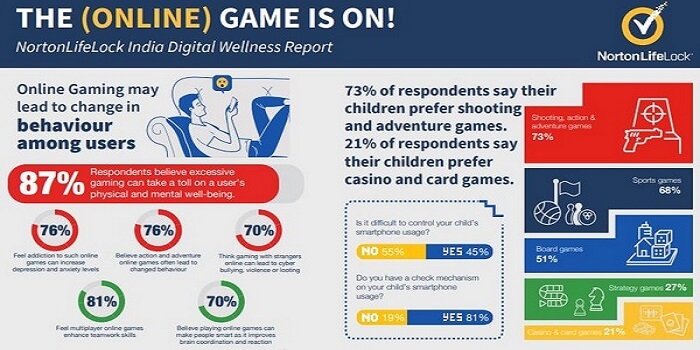Mixed Messages from NortonLifeLock Online Gaming Survey about Well-Being

Findings from NortonLifeLock's third edition of its India digital wellness report have been widely reported in the Indian press over the last 24 hours.
In particular, the figure that 87% of respondents surveyed believe that online gaming takes a toll on their physical and mental well-being has led headlines across the media.
Other data from the report states that:
- 76% of respondents feel that addiction to action games lead to changed behaviour and can increase depression and anxiety levels
- 70% of respondents feel that children connecting with strangers while playing games online can lead to cyberbullying, harassment, and violence
- 73% of the parents in the survey say that their children prefer shooting and adventure games
- 21% say that their children show a preference for casino and card games
- 45% of respondents say they find it difficult to control their children's smartphone usage
- 81% of the respondents who put a check mechanism on children's usage of smartphones feel they have not been effective in controlling the gaming time, as the children of 42% of these respondents play games online for more than two hours every day
Glaws has tried to in vain to find the original report in full, but only has access to the press release issued by NortonLifeLock.
As a result, it's hard to know how the survey was presented to respondents. Did they simple reply whether they 'agree' or 'disagree' to a series of pre-written statements, as appears the case?
Much of the coverage on this report has portrayed online gaming negatively but, taken objectively, many statements have an in-built bias.
As an example, children in contact with strangers in any situation puts them at a higher risk of bullying, harassment and violence - this is certainly not unique to online gaming and is sadly common elsewhere online.
That 76% of people believe addiction to games can lead to behavioural changes and personal issues also seems obvious - an addiction to almost anything is negative.
And with a sample size of just 1,500 - about 0.0001% of the Indian population - it would be unwise to draw broad conclusions from this study. The breakdown of the 1,500 people - for example, their age, sex, education, and experience and access to online gaming - was not published.
But there were also some additional interesting discoveries from NortonLifeLock:
- Online gaming is often presented as a male-dominated industry, but 88% of female respondants found online games to be the best pastime, compared to 86% of males
- 61% of females were willing to skip meals, sleep, or other activities to play online - far higher than the 45% of males who said the same
- 81% of respondents felt multiplayer games improved teamwork skills
- 70% said gaming could help people become smarter by improving brain coordination and reactions.
With the coronavirus lockdown leading to a surge in online gaming and new users, a wider survey with more transparent analysis would be welcome at a time when over 500 million Indians have smartphones, and the online gaming industry in India is expected to be worth US$3.75 billion by 2024.

